- Home
- Suzanne Selfors
Smells Like Treasure Page 22
Smells Like Treasure Read online
Page 22
“You followed me here?”
“Uh-huh.”
Hercules screwed the cap off a tube of anti-itch cream and began applying it to his welts.
“Wait a minute.” Homer pointed at Lorelei. “You followed me that night on the moor. How did you know where I was? You didn’t get off at the train depot. There was only one train. How did you…?” He was starting to understand. Uncle Drake always said, “All that sparkles is not splendid.” A gift from Lorelei wasn’t a gift at all. He reached under his shirt and pulled out the compass. “You’ve been tracking me. That’s how you found me on the moor. And that’s how you followed me to Mushroom Island. You didn’t solve the riddle.” Homer pulled the compass from around his neck and threw it onto the ground. “You’re a cheater.”
Lorelei’s cheeks turned red. Daisy shook the granola wrapper off her head, then scurried over to the compass and claimed it for herself.
“Hey, you guys,” Hercules said, his voice quiet. “I’m not feeling so good.” He rested his head against the cave wall. “My ankle’s burning.”
“Okay,” Homer called as he continued to scan the edge of the cave. “I’m looking. There’s got to be a way out of here.”
With a grunt, Dog got to his feet and waddled over to the side of the cave. He scratched at the wall and whined. “What’s he doing?” Lorelei asked, leaping to her feet. “Is he digging? Does he smell something?”
Dog wasn’t sniffing or rolling—just whining and scratching. “He does that when he wants to go outside and piddle.”
Go outside? Homer rushed to Dog’s side. “I don’t believe it,” Homer said as he gripped a knob that was the same color and texture as the cave wall. Fresh air and sunlight poured in as Homer opened the cave door. With a little kick of his legs, Dog scampered outside and down an embankment, his leash trailing over the rocks. He lifted his leg on a shrub.
“Hercules, we found a way out,” Homer called.
The door had been built into a stone cliff. There was no beach at the base of the cliff. Instead, it gradually dipped into deep water. Homer walked to the water’s edge. A metal post had been pounded between two large stones. A sign attached to the post read: GRIZZLY SANCTUARY. NO HUMANS ALLOWED. A white buoy floated in the water. “This is where she moors a boat. She probably anchors her yacht, then rows to the cave,” Homer said as Lorelei joined him at the water’s edge. “This is how Dr. Magnum gets to her crystals. She posted that sign to keep people away.”
“Grizzly sanctuary?” Lorelei folded her arms. “What I want to know is, what’s a grizzly bear doing on an island in the San Juans?”
“Bears live in caves, right? She probably found it during one of her expeditions and brought it here to protect her loot.”
“Oh.” Lorelei nodded. “Very clever. Maybe I should get a grizzly to protect my lair.”
A horn honked. Homer squinted into the sunlight. “Mr. Pudding!” a voice called.
“Baldwin!” Homer waved ecstatically.
Water lapped over Homer’s boots as a motorboat pulled up with Baldwin at the wheel, a ship captain’s hat on his head. “I motored around the island twice looking for you. I rented this boat for the trip back to the mainland. Where is Mr. Simple?”
“I’m up here,” Hercules called, leaning in the stone doorway.
“It appears that you’ve broken another bone,” Baldwin said as he turned off the motor. “We shall get you to the hospital straight away.” While Baldwin held the boat in place, Lorelei and Homer helped Hercules hobble down the slope and into the boat. “I’m sorry to say that I don’t have a helmet for you, Mr. Simple. The best I could manage was this hat from a gift shop on the mainland.” Baldwin held out a baseball hat with the words I VISITED THE HUMONGOUS FUNGUS WITH TERRY TOUR.
“I don’t need a helmet,” Hercules said as he stretched his leg on the boat’s bench seat. “I jumped out of a plane and survived a grizzly bear without one. I’m beginning to doubt the necessity of helmets.”
“Very good, Mr. Simple.” Baldwin started the engine. “Have you finished your quest, Mr. Pudding? Are you ready to go home?”
“No,” Homer said, a prickly feeling breaking out on his arms. He stared at the baseball cap. “I haven’t finished my quest.”
“Then you intend to stay here?” Baldwin asked.
Homer expected Hercules to insist that they leave together. But, instead, Hercules leaned over the side of the boat and motioned for Homer to step closer. “I know I’m supposed to look after you, Homer, but you can’t give up. You have to find that coin.” He wiped dirt off his mosquito-bitten face, then smiled at Homer. “It’s your dream. Don’t give it up.”
“I’m staying,” Homer told Baldwin.
“What about you, miss? Do you need a ride to the mainland?”
“No, thanks,” Lorelei said. “I’ve got my own ride.”
“Very good.” Baldwin tipped his hat. “As soon as Mr. Simple’s leg is tended to, I shall return for you, Mr. Pudding.” He sat in the driver’s seat and turned the wheel. The boat pulled away.
Hercules waved, then shouted, “Honorificabilitudinitatibus!” Homer waved back, but he didn’t try to repeat the word. It would take more practice. Dog barked his good-bye as the motorboat sped off toward the mainland.
Lorelei stood at the water’s edge, a spaced-out look on her face. She ran a hand over her pink hair. “What’s a humongous fungus?” she asked.
Homer had been trying to figure out the same thing. “Sounds like a really big mushroom.”
“It does sound like a really big mushroom.” Her eyes nearly popped out of her freckled face. “A really, really big mushroom. Maybe even as big as a—”
“As a blue whale,” Homer said.
“How did the riddle go?”
Homer recited, “If ever you meet a mycologist, a spore-loving, fungal find-ologist, he’ll tell you a tale, blue whale in scale, that is sure to best a biologist.”
Lorelei laughed and grabbed Homer’s arm. “I get it. Do you get it? A fungus is a living thing, right? So if there was a fungus as big as a blue whale—”
“Then a mycologist would have a better tale to tell than a biologist.” Homer also laughed. They’d solved the riddle. The Humongous Fungus was the answer.
Lorelei stopped laughing and let go of Homer’s arm. “But where is it? We went to the X. X marks the spot. Isn’t that the rule? X is supposed to mark the spot.”
But Homer knew that wasn’t true. And Lord Mockingbird, a lifelong mapmaker, would also know that wasn’t true. X was a deliberate decoy. Lord Mockingbird had wanted them to find Gertrude’s stash of crystals. But why? And why had he hidden the coin in a different place? “Come on, Dog,” he said as he picked up the end of Dog’s leash.
“Where are you going?”
“I’m going to look for a very big mushroom, and you’re not following me this time.” He pointed to the cave’s doorway where Daisy the rat was rolling the compass around like a toy. “I’m no longer wearing your tracking device.”
“But you have Dog. That’s not fair,” Lorelei called as Homer and Dog climbed along the rocky ridge. “Can’t we do this together? We make such a good team.”
“I don’t trust you,” Homer said. “I’ll never trust you again.”
Another horn sounded out on the water and a large boat appeared. Crammed with people in flowered shirts and sunglasses, the boat rocked side to side as it puttered past. Big letters across the stern read: TERRY TOUR’S TOURS. A voice boomed over the boat’s loudspeaker. “Ladies and gentlemen, we hope you are enjoying your Terry Tour’s Tour today. The third stop on our tour is only a few minutes away. While gigantic fungi can be found in other locations throughout the world, this one is currently the largest on record.” The boat disappeared around the island.
Homer and Lorelei broke into a run.
PART FIVE
THERE AND BACK AGAIN
36
Rumpold Smeller the Boy, Part VII
Rumpoldena s
at outside her brother’s bedroom door.
She held a piece of parchment and gazed at it with wonder. The delicate lines and shadows of the anthill were more beautiful than any pillow she’d ever embroidered. How many pillows had she made in her twelve years? How many would she make if she lived to be an old woman? If she lined all those pillows up on her ninetieth birthday, would they stretch all the way to the sea?
Two months had passed since her brother had been sent into the forest to draw a map. Two days after his departure, his horse had returned to the castle. Wild-eyed and foaming at the mouth, the horse’s flank bore ominous claw marks. The horse had escaped a bear attack, but it had returned without its rider.
Duke Smeller had sent his hunters out to track Rumpold. They found the bear prints in the soft forest floor. They found the signs of the horse’s escape. But they found no signs of Rumpold. No signs that he’d been killed, but also no signs that he’d survived.
And so they feared the worst. “I will never forgive you!” the duchess had screamed at her husband. “My son is gone and it is your fault.”
“The shame is mine to endure,” the duke had said, hanging his head. “My only son will never be a Teutonic knight. The dreams I had for him will never come true.”
But then, after two long months of grief, Rumpoldena sat at her bedroom window and heard someone call her name. She looked down into the courtyard. There stood her brother, waving. She rubbed her eyes. Had his ghost come for a visit? “Rumpold?” she called.
“I did it,” he said, holding up a bundle of papers. “I did it.” And then he crumpled into a heap on the cobblestones.
Though half-starved, he’d survived. His clothing in tatters, his body gaunt and weak, he’d survived. Duke Smeller had never looked so proud. He strode the hallways of the castle. “He did it!” he told everyone. He sent messages to the other knights. “My son finished his quest. He’s drawn a map of our forest.” Not only that, but he’d drawn pictures of rabbits and sparrows, wild honeysuckle and buttercups. Bubbling brooks and weeping willows.
No one was supposed to disturb Rumpold while he recovered. Those were the orders of the physician and the duchess. But Rumpoldena was sick of orders. She sat outside the bedroom, looking at the drawing of the anthill, waiting for her parents and the physician to leave her brother’s room.
Her parents emerged first. The duchess stood and faced her husband, her hands planted on her hips. “My son has done what you asked. But do not think that I will allow you to force him into that secret society of yours. He will never become a Teutonic knight. Never! And I will never allow you to send him away again.”
“Allow?” the duke said with a sputter.
She wagged a finger in his face. “Do not forget that the royal bloodline comes from my side of the family. Cross me on this, and I shall write to my father!”
“But, my dear,” the duke said, his voice softening. “What about the honor of this family? How can I have a son who is not a member of the knighthood? What will he do?”
“He’ll draw,” she said. “That’s what he’ll do. He’ll draw whatever he likes, and you won’t say one word about it.” And she turned on her heels and stomped off toward the women’s quarters. The duke, his shoulders hunched, headed in the opposite direction. Neither had noticed their daughter.
After the physician had left, Rumpoldena crept into her brother’s room and stood by his bed. A tray of cookies and pastries sat on his nightstand, ready to fatten him up. His face was as pale as moonlight. “Hi,” he said, smiling weakly
“Hi.” She held out the parchment. “I like your drawing.” Then she sat on the bed. “How did you survive the bear?”
“I climbed a tree,” he said, his voice raspy. “The bear followed the horse, and I never saw it again.”
“We thought you were dead.”
“I’m sorry.” He closed his eyes for a moment. “I’m still pretty tired. The physician says I need to stay in bed a few more days.”
“You don’t have to be a knight,” she said. “I heard Mother and Father talking about it.”
His eyes flew open. “Really?” She told him what she’d heard. With much effort, Rumpold sat up. “I don’t have to be a Teutonic knight? That’s great news. And I can draw?” His sister nodded. “You know,” he said, leaning back against his pillows, “except for having to survive on my own, I kind of liked drawing that map. Maybe I’ll make more maps.”
Rumpoldena walked to the window and looked out over the castle wall. “Father will leave you alone now. He won’t expect anything of you.”
The door flew open. “There you are,” a maidservant said. “Your mother is looking for you. She wants you in the women’s quarters right away. You have work to do on your pillow.”
“I’ll be right there,” Rumpoldena snapped. “Leave us.”
The maidservant left.
If Rumpoldena had learned one thing while living in the shadows and pushing the needle into the fabric over and over, it was this—that life could be just like a piece of needlepoint. That the girl with the needle could fit the little stitches tidily inside the lines that had already been drawn onto the fabric, or she could ignore the lines altogether, turn the fabric over and create her own pattern.
Rumpoldena returned to her brother’s bed. She knelt beside it and leaned close to his face. “I want to leave this place,” she whispered. “I can’t stand it here.”
He turned his head. “Leave?”
“I don’t want to sit in the women’s quarters for the rest of my life. I’ll go crazy. I want to do something else.”
“Like what?”
“I don’t know.” She fiddled with her hair ribbon. “Maybe I’ll hike up a mountain. Or maybe I’ll ride a camel across the desert. Or maybe I’ll sail the seven seas.”
“Like a pirate?”
“Yes. Like a pirate. Maybe I’ll become a pirate and then I can go wherever I want to go and do whatever I want to do.” She reached into her bodice and pulled out a small bag. “I stole these coins from Father’s desk. I can use these to buy myself a ship and a crew.”
Rumpold nodded. “I almost ran away.” Then he reached out slowly and took his sister’s hand. His grip was weak, but the look in his eyes was steely. “In my charcoal case.”
The case sat in the corner. Rumpoldena opened it and found another bag, heavy with coins. “Take it,” Rumpold said. His eyelids fluttered.
As her brother drifted back into a deep sleep, Rumpoldena sat at the mirror and pulled the ribbon from her hair. Then she began to cut. Clump after blond clump fell away. She changed into her brother’s best clothes—a long-sleeved white shirt, a vest, and a gold-buttoned jacket. The britches fit after she’d tied the waist with a cord, and the boots fit once she’d tucked a few handkerchiefs inside. She found a small knife that Rumpold never used. She tucked it, along with the two bags of coins, into a leather satchel. She rolled up the anthill drawing and tucked it into the leather satchel as well. “Good-bye. I’ll never forget you.” Then she kissed her brother’s damp forehead. “And if I ever need a treasure map, I’ll let you know.”
Down the stairs she ran, past servants who gasped and said, “Rumpold’s recovered.” She didn’t say good-bye to anyone else. She didn’t look over her shoulder or shed a tear.
What she did shed, however, was her old self.
37
The Membership Coin
It made no sense for Lorelei to try to outrun Homer. What could she do without Dog? A gold coin stuck somewhere in a mushroom bigger than a blue whale could take days to find. That’s why Lorelei trotted alongside Homer, her backpack bouncing with each step, the crystals singing from inside the clue box. Daisy soon caught up, then scampered ahead.
Homer could see Lorelei’s beaming smile from the corner of his eye, but he didn’t look at her. If he looked directly at her, she might detect his fear. And he feared more than anything that he would lose the quest. She was faster, nimbler, more athletic in every way. If she
grabbed the coin first, Homer would disappoint Zelda and Ajitabh, his uncle’s dearest friends. But most of all, he’d disappoint himself.
Terry Tour’s tour boat dropped anchor in a small cove. Harbor seals poked their gray heads from the calm water, watching the boat with aloof curiosity. The tourists, binoculars in hand, gathered on the shore side of the boat, which tipped precariously close to the water.
“Ladies and gentlemen, welcome to the Humongous Fungus,” the loudspeaker voice said.
“Where is it? Where is it?” the tourists shouted, pointing their binoculars toward a large clearing where no trees grew. Kids jumped up and down with excitement.
“The Humongous Fungus grows on this side of Mushroom Island beneath the forest floor, so it is not visible to the eye,” the loudspeaker voice said.
A deep groan filled the air as the tourists let the binoculars fall to their sides.
The loudspeaker voice cleared his throat. “But even though you can’t see the fungus, we guarantee that it is there.”
The tourists looked at one another and shrugged.
“Ladies and gentlemen, the next stop on our tour is the Magical White Rock of Bird Island, a rock covered with so much seagull poop that it has actually turned white.”
“Oooh,” the tourists said, applauding excitedly as the tour boat turned around and puttered out of the cove.
Homer and Lorelei crept from their hiding place behind a tree, where Dog had been going berserk. Sniffing the air, he eagerly pumped his back legs, but Homer held him firmly in place, waiting for the boat to drive out of sight. No one needed to witness the treasure-smelling dog in action. Lorelei dropped her backpack and rolled up her striped sleeves. “Watch my stuff,” she told Daisy. The rat obediently settled on top of the backpack and began to groom her tail.
Dog grunted and pulled. “Ur, ur, ur, ur.” He strained against the collar as Homer took slow steps forward. Lorelei matched each of his steps.

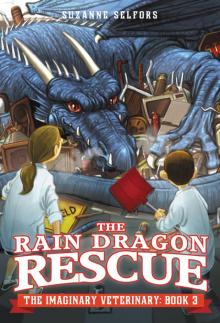 The Rain Dragon Rescue
The Rain Dragon Rescue Ginger Breadhouse and the Candy Fish Wish
Ginger Breadhouse and the Candy Fish Wish Ever After High: Lizzie Hearts and the Hedgehog’s Hexcellent Adventure: A Little Shuffle Story
Ever After High: Lizzie Hearts and the Hedgehog’s Hexcellent Adventure: A Little Shuffle Story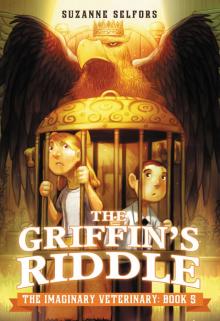 The Griffin's Riddle
The Griffin's Riddle Smells Like Pirates
Smells Like Pirates Duchess Swan and the Next Top Bird
Duchess Swan and the Next Top Bird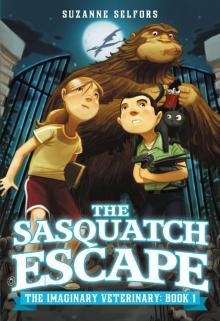 The Sasquatch Escape
The Sasquatch Escape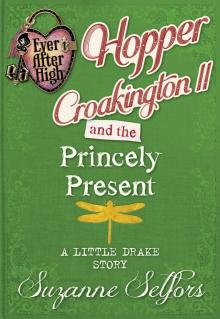 Hopper Croakington II and the Princely Present
Hopper Croakington II and the Princely Present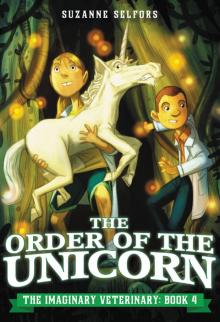 The Order of the Unicorn
The Order of the Unicorn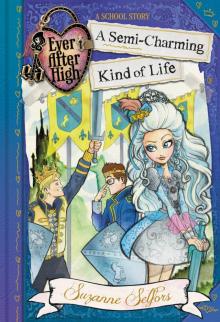 A Semi-Charming Kind of Life
A Semi-Charming Kind of Life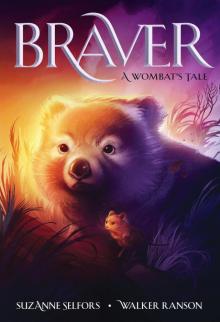 Braver
Braver Kiss and Spell
Kiss and Spell Wedgie & Gizmo
Wedgie & Gizmo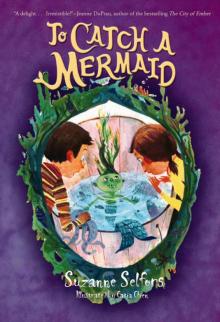 To Catch a Mermaid
To Catch a Mermaid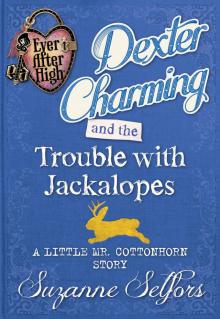 Dexter Charming and the Trouble with Jackalopes
Dexter Charming and the Trouble with Jackalopes The Sweetest Spell
The Sweetest Spell CoffeeHouse Angel
CoffeeHouse Angel Wish Upon a Sleepover
Wish Upon a Sleepover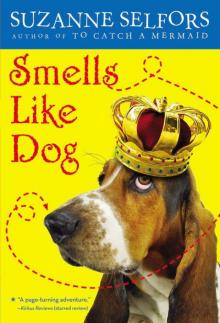 Smells Like Dog
Smells Like Dog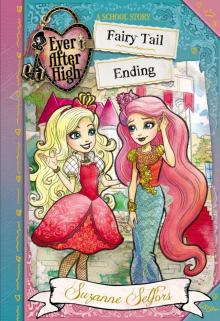 Ever After High
Ever After High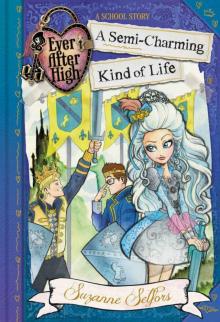 Ever After High: A Semi-Charming Kind of Life
Ever After High: A Semi-Charming Kind of Life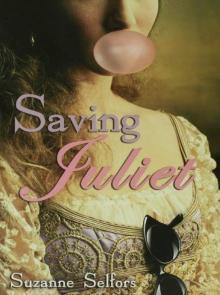 Saving Juliet
Saving Juliet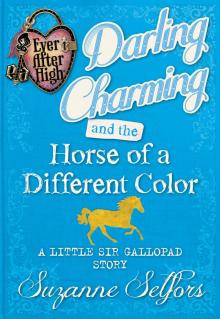 Darling Charming and the Horse of a Different Color
Darling Charming and the Horse of a Different Color Wedgie & Gizmo vs. the Toof
Wedgie & Gizmo vs. the Toof Spirit Riding Free--The Adventure Begins
Spirit Riding Free--The Adventure Begins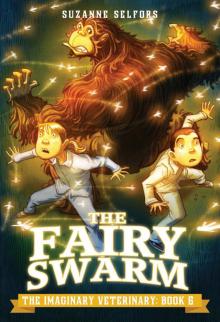 The Fairy Swarm
The Fairy Swarm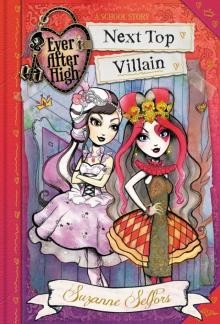 Ever After High: Next Top Villain: A School Story
Ever After High: Next Top Villain: A School Story Fortune's Magic Farm
Fortune's Magic Farm The Lonely Lake Monster
The Lonely Lake Monster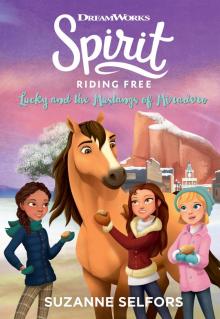 Spirit Riding Free--Lucky and the Mustangs of Miradero
Spirit Riding Free--Lucky and the Mustangs of Miradero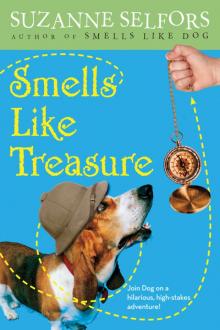 Smells Like Treasure
Smells Like Treasure Mad Love
Mad Love